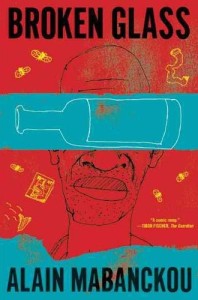 An alcoholic jots down stories about his favorite bar, the joint’s patrons and his own muddled life.
An alcoholic jots down stories about his favorite bar, the joint’s patrons and his own muddled life.
Country Focus: Republic of the Congo
Broken Glass
By Alain Mabanckou
Translated by Helen Stevenson
Originally published as Verre cassé by Éditions du Seuil, 2010.
My edition: Soft Skull, 2010.
165 pgs.
Genre: Fiction
Time period: Contemporary
World Lit Up Rating: ![]()
![]()
![]()
(On a scale of 1-5, with 1 book = turned off and 5 books = lit up)
A nearly permanent resident of the bar Credit Gone West, Broken Glass fills his time drinking glasses of Sovinco Red and eating plates of bicycle chicken. He’s presented with a new diversion when the bar’s owner, Stubborn Snail, gives the ex-teacher a notebook and tells him to write “a book about us, a book about this place, there’s no other place like it on earth.” Stubborn Snail is not exaggerating; the bar’s opening nearly set off a civil war, an event known thereafter as “The Credit Gone West Affair.”
Broken Glass takes him up on the offer. Broken Glass is the raw guts of said notebook, filled with characters and events that Charles Bukowski would happily crib or that Tom Waits would jackhammer out of his mouth. These stories are about Congolese living on the margins: a brutalized ex-con called “Pampers;” a cuckold betrayed by his own son; and Robinette, a woman who can out-piss almost any man.
Eventually, Broken Glass turns reflective and starts writing about his own life. He divulges that his mother drowned herself in the local river, the reasons why he lost his job, and his doomed relationship with his ex-wife, Angelica, who he now calls “Diabolica.”
Throughout Broken Glass, Mabanckou references numerous literary works. The Catcher in the Rye garners the biggest allusion, particularly that novel’s oft repeated question, “Where do the ducks go in the wintertime?”
A note on the writing style: Broken Glass’s sentences never stop for a rest. There’s not one period in the entire novel, just thoughts strung together by dozens of commas. Sporadic section and page breaks let the reader come up for air occasionally. I’m not a fan of writers who ignore punctuation rules, but I’ll put up with them and even – in the case of Cormac McCarthy and José Saramago – enjoy their work despite their rebellious grammar. Mabanckou displays a disarming sense of humor by mocking his own character’s writing style (see quote below).
Broken Glass is a little coarse for my taste, but there’s no doubt that Mabanckou has crafted an impressive novel that’s kicking and reeling and squirming with down-and-out Congolese.
Quote:
…I’d say it in my own words, twisted words, incoherent words, nonsensical words, I’d write down words as they came to me, I’d begin awkwardly and I’d finish as awkwardly as I’d begun, and to hell with pure reason, and method, and phonetics, and prose, and in this shit-poor language of mine things would seem clear in my head but come out wrong, and the words to say it wouldn’t come easy, so it would be a choice between writing or life, that’s right, and what I really want people to say when they read me is “what’s this jumble, this mess, this muddle, this mishmash of barbarities, this empire of signs, this chitchat, this descent to the dregs of belles lettres, what’s with this barnyard prattle, is this stuff for real, and where does it start, and where the hell does it end?”

Another intriguing book. Thanks for introducing me to this one.
LikeLike
By: Kai @embraceyoumag on June 21, 2012
at 2:53 pm
Definitely unique. The LA Times recently published an article on Mabanckou, which you might want to check out:http://articles.latimes.com/2012/apr/29/entertainment/la-ca-alain-mabanckou-20120429
LikeLike
By: koolwine on June 21, 2012
at 4:52 pm
Reblogged this on EMBRACE YOU and commented:
Awesome!
LikeLike
By: Kai @embraceyoumag on June 21, 2012
at 2:54 pm
Thanks for the reblog on Embrace You! I read that you plan on visiting Lebanon. About a year ago, I reviewed “my Lebanon book”: The Hakawati by Rabih Alameddine. It was tough going for me, but you might want to give it a shot.
LikeLike
By: koolwine on June 21, 2012
at 5:10 pm
Interesting. Thanks for the tip.
LikeLike
By: Kai @embraceyoumag on June 21, 2012
at 5:21 pm
Interesting read..:-)
LikeLike
By: gangulysubhajit on June 23, 2012
at 4:09 pm
It helps when the book is so distinctive!
LikeLike
By: koolwine on June 24, 2012
at 8:55 am